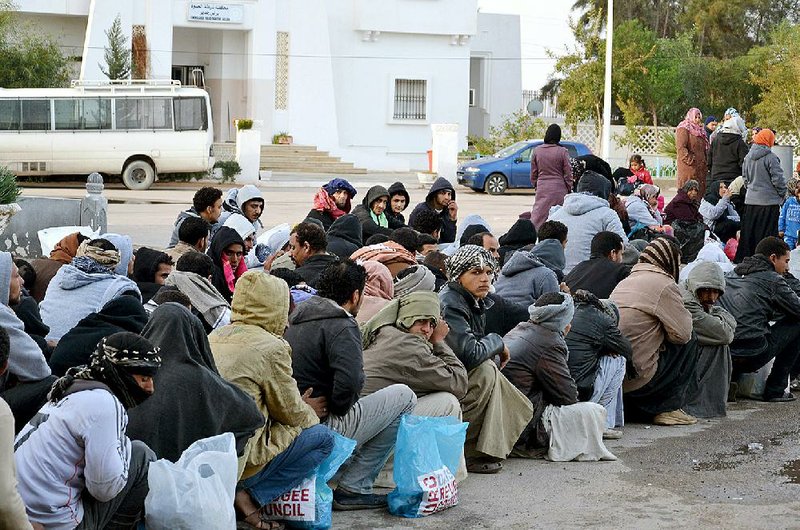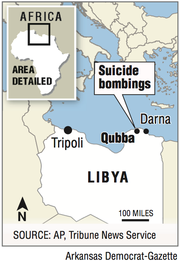TRIPOLI, Libya -- Islamic State militants unleashed suicide bombings Friday in eastern Libya, killing at least 40 people in what the group said was retaliation for Egyptian airstrikes against the extremists' aggressive new branch in North Africa.
The bombings in the town of Qubba, which is controlled by Libya's internationally recognized government, solidified concerns the extremist group has spread beyond the battlefields of Iraq and Syria and established a foothold less than 500 miles from the southern tip of Italy.
The militants have taken over at least two Libyan coastal cities on the Mediterranean -- Sirte and Darna, which is about 19 miles from Qubba. They released a video Sunday that showed the beheading of 21 Egyptian Christians who were abducted in Sirte, and Egypt responded Monday with airstrikes on Darna.
The Islamic State has established its presence in Libya by exploiting the country's breakdown since dictator Moammar Gadhafi was ousted and killed in 2011. Hundreds of militias have taken power since then, and some of them have militant ideologies. A militia coalition known as Libya Dawn has taken over Tripoli, where Islamists set up their own parliament and government. Islamic extremist militias controlled the second-largest city of Benghazi until late last year, when army troops began battling them for control.
The Islamic State claimed responsibility for Friday's suicide bombings in Qubba, but said there were only two attacks, while the government said there were three.
Army spokesman Mohammed Hegazi said one attacker rammed an explosives-packed ambulance into a gas station where motorists were lined up.
"Imagine a car packed with a large amount of explosives striking a gas station; the explosion was huge and many of the injured are in very bad shape while the victims' bodies were torn into pieces," Hegazi said.
Two other bombers detonated vehicles next to the house of the parliament speaker and the nearby security headquarters, he said.
Government spokesman Mohammed Bazaza put the death toll at 40, with at least 70 injured, some seriously. The number of dead was expected to rise. Two security officials, speaking on condition of anonymity because they were not authorized to talk to the media said at least 45 were killed.
Among the dead were six Egyptians working at a cafe next to the gas station.
Video broadcast from the scene showed dozens of cars wrecked and ablaze, with pools of blood on the asphalt, along with body parts, shoes and shattered glass. Bodies covered in sheets were lined up nearby. The government and parliament announced a week of mourning.
"This terrorist, cowardly and desperate attack only increases our determination to uproot terrorism in Libya and in the region," Bazaza said, adding that Libyan air force jets conducted several airstrikes, without specifying where.
Witnesses in the city of Sirte said it was hit by multiple Libyan airstrikes Friday, targeting a convention center that is used as a headquarters by the Islamic State.
U.S. State Department spokesman Jen Psaki said Washington condemned the attacks in Qubba.
Embargo remains
In addition to launching airstrikes on Darna earlier this week, Egypt joined Libya's elected government in pressing for a United Nations Security Council resolution to lift a U.N. arms embargo on Libya and pave the way for international intervention -- similar to the U.S.-led campaign in Syria and Iraq against the Islamic State.
Libya's foreign minister told an emergency council meeting Wednesday that lifting the embargo is necessary as the militant group establishes a presence in northern Africa and moves closer to Europe. Alarm soared after a video released over the weekend showed the beheading of 21 Egyptian Coptic Christians there.
"If we fail to have arms provided to us, this can only play into the hands of extremists," Mohammed al Dairi said.
But Security Council members U.S. and Britain rejected the call, saying Thursday that Libya needs a national unity government first.
"The problem is that there isn't a government in Libya that is effective and in control of its territory," British Foreign Secretary Philip Hammond said during a visit to Spain. "There isn't a Libyan military which the international community can effectively support."
Libya first needs a government of national unity in place, along with a U.N. presence in the country, he said.
"But simply pouring weapons into one faction or the other, which is essentially what has been proposed, is not to bring us to a resolution to the crisis in Libya, and is not going to make Europe safer, is going to make it more at risk," Hammond said.
The U.N. embargo has been in place since 2011, the year Gadhafi was overthrown.
In Washington, Psaki said the U.S. position on keeping the arms embargo hasn't changed. "It permits transfers necessary to support the Libyan government while allowing the Security Council to seek guard against the high risk that weapons may be diverted to nonstate actors."
A spokesman for Libya's mission to the U.N. said he could not comment Thursday night.
Libya can apply for weapons imports under an exemption in the arms embargo for the Libyan government, but the Security Council committee that considers such requests has been cautious about giving approval because of concern that weapons might be leaked to armed groups.
Libya is split between two rival parliaments and governments. The elected and internationally recognized parliament has been forced to relocate to the eastern city of Tobruk near the Egyptian border because Tripoli has been overrun by the Islamic and tribal militias. Meanwhile, an older pre-election parliament, supported by the militias, has remained in Tripoli and declared itself legitimate.
As violence has escalated dramatically across the country since summer, hundreds of thousands of Libyans have been displaced and entire cities and towns have been left in ruins. Islamic militias, including extremists from the Islamic State, are battling government forces for control of Benghazi in eastern Libya.
The Tripoli-based government, which is partially supported by Islamist factions and militias from the western city of Misrata, continued to deny the presence of an Islamic State affiliate in Libya. In a speech Thursday, Omar al-Hassi, the chosen prime minister of the Tripoli government, blamed the recent violence on Gadhafi loyalists and said the beheading video was "fabricated."
However al-Hassi also urged Egyptians to leave the country, saying that authorities can't ensure their safety.
Heeding such warnings, a group of nearly 200 Egyptians have crossed into Tunisia from Libya, the first of thousands expected to flee the turmoil in the country.
Authorities said 192 Egyptians went through the Ras Jdir border crossing Friday and headed to the Djerba airport where they will fly back to Cairo.
Egypt has said it will send planes to transport home its citizens.
The Egyptians were briefly held up by protesters in the Tunisian border town of Ben Guerdane who have been calling for greater government investment in the impoverished region.
The protesters eventually let through the Egyptians, giving them bread and water. Many more are expected.
Meanwhile, the relatives of four Coptic Christian hostages held by gunmen in Libya for months are appealing for help from local and Libyan authorities to ensure their safe release.
The four hostages, all members of the same family from the southern Egyptian city of Abu Teeg, were abducted last August while trying to flee the Libyan capital, Tripoli.
Wageh Hakim, whose brother and cousins are being held, told The Associated Press on Friday that the four men were separated from Muslim friends at a checkpoint.
The four men were working in Tripoli as construction workers when Islamic and tribal militias overran the capital in August.
Information for this article was contributed by Esam Mohamed, Maggie Michael, Cara Anna and staff members of The Associated Press.
A Section on 02/21/2015


